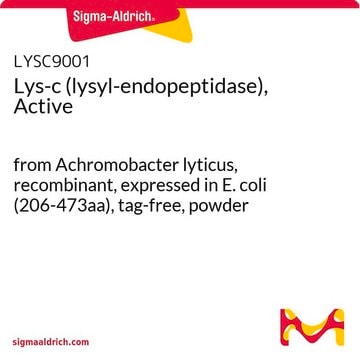29208
(N-Succinimidyloxycarbonylmethyl)tris(2,4,6-trimethoxyphenyl)phosphonium bromide
for protein sequence analysis (by MALDI-MS), ≥98.5%
Sinónimos:
N-Succinimidyl [tris(2,4,6-trimethoxyphenyl)phosphonio]acetate bromide, TMPP-Ac-OSu
About This Item
Productos recomendados
grade
for protein sequence analysis (by MALDI-MS)
Quality Level
assay
≥98.5% (HPLC)
≥98.5%
technique(s)
MALDI-MS: suitable
mp
199-205 °C (dec.)
storage temp.
−20°C
SMILES string
[Br-].COc1cc(OC)c(c(OC)c1)[P+](CC(=O)ON2C(=O)CCC2=O)(c3c(OC)cc(OC)cc3OC)c4c(OC)cc(OC)cc4OC
InChI
1S/C33H39NO13P.BrH/c1-38-19-12-22(41-4)31(23(13-19)42-5)48(18-30(37)47-34-28(35)10-11-29(34)36,32-24(43-6)14-20(39-2)15-25(32)44-7)33-26(45-8)16-21(40-3)17-27(33)46-9;/h12-17H,10-11,18H2,1-9H3;1H/q+1;/p-1
InChI key
YKMSQZIYVKTUHI-UHFFFAOYSA-M
General description
Application
Packaging
Other Notes
related product
Storage Class
11 - Combustible Solids
wgk_germany
WGK 3
flash_point_f
Not applicable
flash_point_c
Not applicable
ppe
Eyeshields, Gloves, type N95 (US)
Elija entre una de las versiones más recientes:
¿Ya tiene este producto?
Encuentre la documentación para los productos que ha comprado recientemente en la Biblioteca de documentos.
Nuestro equipo de científicos tiene experiencia en todas las áreas de investigación: Ciencias de la vida, Ciencia de los materiales, Síntesis química, Cromatografía, Analítica y muchas otras.
Póngase en contacto con el Servicio técnico







